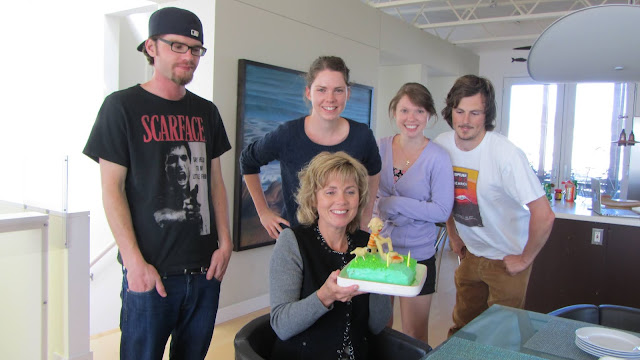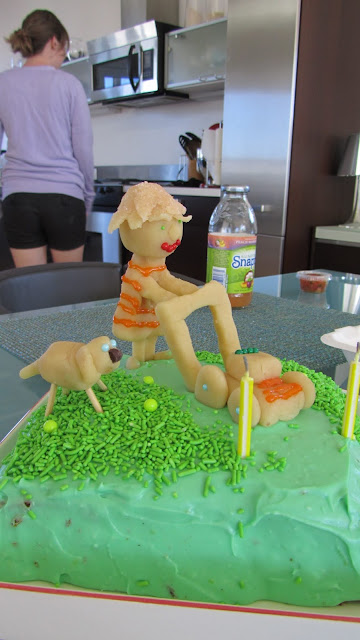Wie geht's?
Emotional intelligence (EI) as a thing has cropped up in a few conversations lately. I guess it's a continuum of sorts and we can all place ourselves along that pathway and track our development.
This post is designed to provide a few starting points to calibrate where your EI is at right now.
I'm comfortable with my own status, while acknowledging that there are areas (not in bold below) that I haven't yet attained.
Ten years ago I was doing a qualification in the UK called the National Professional Qualification for Headship (NPQH) and my examiner asked me if I thought I was the finished article. I reacted with horror at that idea and was upset that he thought I thought so much of myself.
When Do You Know You Are Emotionally Mature? (you can read the whole post here if you wish)
You realise that most of the bad behaviour of other people really comes down to fear and anxiety – rather than, as it is generally easier to presume, nastiness or idiocy.
You loosen your hold on self-righteousness and stop thinking of the world as populated by either monsters or fools. It makes things less black and white at first, but in time, a great deal more interesting.
You learn that what is in your head can’t automatically be understood by other people. You realise that, unfortunately, you will have to articulate your intentions and feelings with the use of words – and can’t fairly blame others for not getting what you mean until you’ve spoken calmly and clearly.
You learn that – remarkably – you do sometimes get things wrong. With huge courage, you take your first faltering steps towards (once in a while) apologising.
You learn to be confident not by realising that you’re great, but by learning that everyone else is just as stupid, scared and lost as you are. We’re all making it up as we go along, and that’s fine.
You stop suffering from impostor syndrome because you can accept that there is no such thing as a legitimate anyone. We are all, to varying degrees, attempting to act a role while keeping our follies and wayward sides at bay.
You forgive your parents because you realise that they didn’t put you on this earth in order to insult you. They were just painfully out of their depth and struggling with demons of their own. Anger turns, at points, to pity and compassion.
You realise that when people close to you nag you, or are unpleasant or vindictive, they usually aren’t just trying to wind you up, they may be trying to get your attention in the only way they know how.
You give up sulking. If someone hurts you, you don’t store up the hatred and the hurt for days. You remember you’ll be dead soon. You don’t expect others to know what’s wrong. You tell them straight and if they get it, you forgive them. And if they don’t, in a different way, you forgive them too.
You realise that because life is so very short, it’s extremely important that you try to say what you really mean, focus on what you really want, and tell those you care about that they matter immensely to you. Probably every day.
You cease to believe in perfection in pretty much every area. There aren’t any perfect people, perfect jobs or perfect lives. Instead, you pivot towards an appreciation of what is (to use the psychoanalyst Donald Winnicott’s exemplary phrase) ‘good enough.’ You realise that many things in your life are at once quite frustrating – and yet, in many ways, eminently good enough.
You learn the virtues of being a little more pessimistic about how things will turn out – and as a result, emerge as a calmer, more patient and more forgiving soul. You lose some of your idealism and become a far less maddening person (less impatient, less rigid, less angry).
You learn to see that everyone’s weaknesses of character are linked to counter-balancing strengths. Rather than isolating their weaknesses, you look at the whole picture: yes, someone is rather pedantic, but they’re also beautifully precise and a rock at times of turmoil. Yes someone is a bit messy, but at the same time brilliantly creative and very visionary. You realise (truly) that perfect people don’t exist – and that every strength will be tagged with a weakness.
You fall in love a bit less easily. It’s difficult, in a way. When you were less mature, you could develop a crush in an instant. Now, you’re poignantly aware that everyone, however externally charming or accomplished, would be a bit of a pain from close up. You develop loyalty to what you already have.
You learn that you are – rather surprisingly – quite a difficult person to live with. You shed some of your earlier sentimentality towards yourself. You go into friendships and relationships offering others kindly warnings of how and when you might prove a challenge.
You learn to forgive yourself for your errors and foolishness. You realise the unfruitful self-absorption involved in simply flogging yourself for past misdeeds. You become more of a friend to yourself. Of course you’re an idiot, but you’re still a loveable one, as we all are.
You learn that part of what maturity involves is making peace with the stubbornly child-like bits of you that will always remain. You cease trying to be a grown up at every occasion. You accept that we all have our regressive moments – and when the inner two year old you rears its head, you greet them generously and give them the attention they need.
You cease to put too much hope in grand plans for the kind of happiness you expect can last for years. You celebrate the little things that go well. You realise that satisfaction comes in increments of minutes. You’re delighted if one day passes by without too much bother. You take a greater interest in flowers and in the evening sky. You develop a taste for small pleasures.
What people in general think of you ceases to be such a concern. You realise the minds of others are muddled places and you don’t try so hard to polish your image in everyone else’s eyes. What counts is that you and one or two others are OK with you being you. You give up on fame and start to rely on love.
You get better at hearing feedback. Rather than assuming that anyone who criticises you is either trying to humiliate you or is making a mistake, you accept that maybe it would be an idea to take a few things on board. You start to see that you can listen to a criticism and survive it – without having to put on your armour and deny there was ever a problem.
You realise the extent to which you tend to live, day by day, in too great a proximity to certain of your problems and issues. You remember – more and more – that you need to get perspective on things that pain you. You take more walks in nature, you might get a pet (they don’t fret like we do) and you appreciate the distant galaxies above us in the night sky.
You cease to be so easily triggered by people’s negative behaviour. Before getting furious or riled or upset, you pause to wonder what they might really have meant. You realise that there may be a disjuncture between what someone said and what you immediately assumed they meant.
You recognise how your distinctive past colours your response to events – and learn to compensate for the distortions that result. You accept that, because of how your childhood went, you have a predisposition to exaggerate in certain areas. You become suspicious of your own first impulses around particular topics. You realise – sometimes – not to go with your feelings.
When you start a friendship, you realise that other people don’t principally want to know your good news, so much as gain an insight into what troubles and worries you, so that they can in turn feel less lonely with the pains of their own hearts. You become a better friend because you see that what friendship is really about is a sharing of vulnerability.
You learn to calm your anxieties not by telling yourself that everything will be fine. In many areas, it won’t. You build up a capacity to think that even where things go wrong, they are broadly survivable. You realise that there is always a plan B; that the world is broad, that a few kindly souls are always to be found and that the most horrid things are, in the end, endurable.
Love and peace - Wozza
















